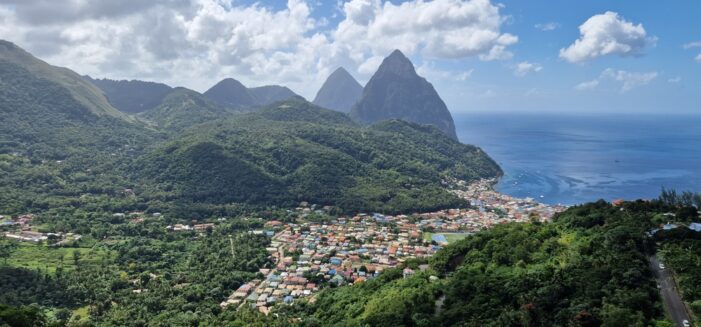Saint Lucia is a volcanic twin-peaked island in the Eastern Caribbean, celebrated for its lush rainforests, Creole heritage, and globally recognized Citizenship by Investment (CBI) program. Blending Afro‑Creole identity, English accessibility, and investor-friendly incentives, it offers African American investors rich opportunities in tourism, culture, agriculture, and citizenship mobility.
- Culture & Identity
Saint Lucia’s culture is deeply shaped by African, French, British, and Indian influences. Around 85% of its population is of African descent, contributing to a vibrant cultural ecosystem of music, dance, festivals, cuisine, and language.
- Music & Festivals: Traditional folk genres like kwadril, jwé, and calypso are performed alongside modern zouk, soca, and reggae. The famed La Rose & La Marguerite societies organize annual festivals celebrating community identity. Saint Lucia also hosts the internationally renowned Jazz Festival and Jounen Kwéyòl (Creole Day) every October, spotlighting folk music, Creole cuisine, and cultural pride.
- Cuisine & Faith: The national dish—green fig and saltfish—is accompanied by bouyon, callaloo, breadfruit, and spiced Punch. Indian culinary influence remains alive via roti, curry, and biryani—introduced by indentured laborers in the 19th century.
- Traditional Religion: Kélé is an Afro‑Lucian religious tradition with Yoruba roots, practiced in drumming ceremonies honoring spirits like Ogun and Shango.
This rich cultural environment provides fertile ground for diaspora-aligned ventures in heritage tourism, music festivals, culinary tourism, and storytelling residencies.
- Language & Cultural Cohesion
- The official language is English, used in government, education, and commerce.
- Kwéyòl (Saint Lucian Creole French)—a French‑lexified Creole enriched with African linguistic features—is widely spoken in rural communities and public life. For locals, Kwéyòl is not just language but cultural identity: “Creole is our culture… Creole we learn from Africa”.
For African American investors, English fluency ensures accessibility while appreciation or incorporation of Kwéyòl culture adds authenticity and resonance.
- Economic Landscape & Resource Sectors
Saint Lucia’s economy has transitioned from sugar-based agriculture to a service-led model centered on tourism, financial services, and niche exports:
- Tourism remains dominant, accounting for approximately 65% of GDP and supporting two-thirds of employment. Natural attractions (e.g. the Pitons), luxury resorts, eco-adventures, and festivals bring ~900,000 annual visitors.
- Agriculture, now contributing under 3% of GDP but still employing ~10–20% of the population, produces bananas, cocoa, mangoes, and avocados. Local brands—honey, cocoa, coconut oil—are being promoted via the Taste of Saint Lucia export initiative.
- Financial & offshore services, free zones, and light manufacturing are developing, though tourism remains the primary growth driver.
- Citizenship by Investment & Tax Incentives
Saint Lucia’s CBI program, established in 2015, is one of the Eastern Caribbean’s most respected and accessible. In 2025 it was confirmed among five regional nations offering citizenship for investments starting around USD 200,000.
Key investment routes include:
- National Economic Fund (donation): minimum USD 240,000 for a principal applicant plus up to three dependants.
- Government bonds or approved real estate/business projects: minimum USD 300,000.
- Large enterprise contributions: USD 3.5 million and higher for strategic infrastructure or business ventures.
Benefits include:
- Visa‑free access to ~145 countries, including the EU, UK, Singapore, and Hong Kong.
- No residency requirement, rapid processing (6–12 months), and dual citizenship allowed.
- Tax neutrality: no tax on global income, capital gains, or inheritance for citizens.
- Investment Opportunities for African American Investors
Heritage & Cultural Tourism
Projects like boutique heritage lodges, cultural festivals highlighting Jounen Kwéyòl, or Afro‑Creole cuisine tours can tap into diaspora connection and experiential tourism trends.
Creative Economy & Performing Arts
Saint Lucia’s music traditions, storytelling societies, and growing creative sector provide space for film, music residencies, cultural branding, and art partnerships anchored in Afro-Caribbean identity.
Real Estate & Hospitality
Developing CBI-approved real estate—boutique resorts or villa rentals—bridges citizenship eligibility with rental yield (~3–5%) and diaspora-targeted hospitality offerings.
Agri‑business & Eco‑Food Brands
Opportunities exist in high-value crops (cocoa, mango, honey), artisanal agro-processing, wellness brands, and export-ready foods under Taste of Saint Lucia export promotion.
Business & Shared Services
Establishing export-oriented firms—consulting, creative design studios, digital firms—can benefit from tax-neutral personal environment and pro-diaspora positioning.
- Strategic Approaches for African American Investors
- Clarify your objective: Citizenship, cultural legacy-building, tourism impact, or financial return?
- Select investment path: Fund donation (lowest entry), real estate, or enterprise contribution aligned with business goals.
- Partner locally: Work with agencies like CIU (Citizenship by Investment Unit), cultural societies (La Rose & Marguerite), and tourism boards for community-rooted authenticity.
- Embed culture: Incorporate Kwéyòl music, Creole cuisine, folk dance (kwadril), and storytelling into branding.
- Engage legal experts: Use authorized CIP agents and local counsel to manage application, real estate title, and compliance.
- Align with ESG values: Eco‑tourism, community partnerships, agro-sustainability projects yield both investment incentives and diaspora alignment.
- Outlook & Summary
Saint Lucia offers a potent mix of Afro‑Creole cultural richness, English accessibility, and investor mobility through its CBI program. The island’s investor framework supports diaspora-focused tourism, music and arts ventures, boutique real estate, and agro-innovation—all within a tax-neutral climate backed by global mobility.
For African American investors seeking to merge heritage, impact, and strategic returns, Saint Lucia provides fertile terrain: secure citizenship, respectful cultural engagement, and the possibility to build enterprises that honor identity and connect across the African diaspora.


